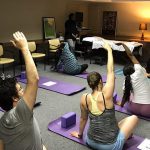Felisha Kun was diagnosed with diabetes when she was 9 years old. Since then, she had been told by doctors that she wouldn’t live past age 25.
“It was always so hard for me,” she said, fighting off tears. “I always had this death sentence hanging above my head.”
Despite the complications her illness caused, Kun, now 30, learned to live with her diabetes through medications and monitoring. In September 2016, she found out she was pregnant. Everything was going as planned until about two months into her pregnancy, when she suddenly became very swollen. She immediately went to UPMC Magee-Womens Hospital, and what doctors told her there changed her life forever.
“I wanted to make sure everything was OK with the baby,” Kun said. “When I got to the hospital, the doctors asked me how long I had been in kidney failure, and my jaw dropped to the floor.”
Kun ended up losing the baby at 25 weeks, and her kidneys never returned to normal. The word “dialysis” was mentioned by her physicians. Luckily, Kun didn’t have to go through any of this alone – her mom, Patricia Kasan, was with her every step of the way.
“Felisha is not only my daughter, but she is also my best friend,” Kasan said. “When I found out she was close to being on dialysis, I immediately stepped in to see what I could do.”
Eventually, Kasan looked into donating one of her kidneys to Kun through the Kidney and Pancreas Transplant Program at UPMC, which has performed more than 4,200 successful transplants since it first started in 1988.
After going through the evaluation process, Kasan learned she was a perfect match for her daughter, and their transplant surgery was scheduled for late November of last year.
“I purposefully made the surgery for after Thanksgiving, so I could celebrate one last holiday with my family in case anything went wrong,” Kun said.
After the successful surgery, Kasan was discharged from the hospital the next morning, and Kun had to stay for only a few days to rehabilitate.
According to Dr. Amit Tevar, surgical director of kidney and pancreas transplantation at UPMC, this was a routine transplant that shows how quickly the healing process can be for both the donor and the recipient.
“It’s typically a pretty quick healing process when it comes to kidney transplants,” Tevar said. “This allows patients to resume their normal lives, which is ultimately what we want them to do.”
Post-surgery, Kun’s condition improved tremendously. She introduced exercise back into her routine, and she took a trip to Colorado and went mountain climbing to celebrate her new strength.
“I climbed mountains I never thought I would climb,” she said.
After saving her daughter’s life by being her living donor, Kasan is now an advocate for organ donation, and she is even considering donating part of her liver to someone in the future through the UPMC Living-Donor Liver Transplant Program.
“Don’t be afraid to donate,” she said. “Not only are you blessing your life, but you’re blessing someone else.”
Kun recently received a second transplant – this time, a pancreas from a deceased donor. Tevar said this is a common procedure done on patients with severe diabetes.
“In cases like Felisha’s, we typically try to do kidney transplants and pancreas transplants simultaneously, but her mom volunteered as a living donor,” Tevar said. “We elected to do the pancreas transplant separately, and the surgery was successful. Now that she’s healthier and not held back by her disease, we are expecting some pretty cool postcards from her in the future.”
Today, Kun is soaking up her second chance at life. Looking back, she is still amazed at the obstacles she’s conquered.
“I never thought I would ever make it to this point – not only am I still alive, but I am completely diabetes-free,” she said. “I owe everything to my mom and to my doctors at UPMC. They saved my life.”
To get more stories like this directly to your inbox, subscribe to our weekly Inside Life Changing Medicine newsletter at bit.ly/upmc_newsletter.








